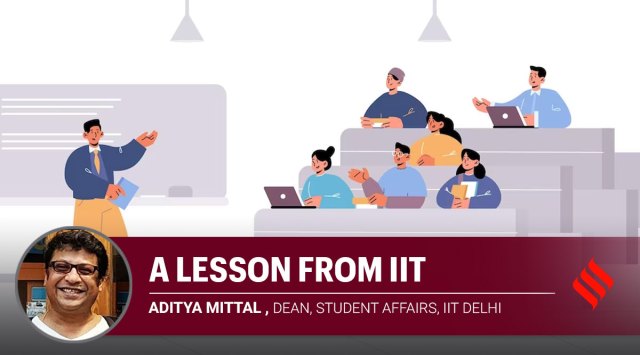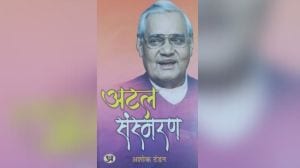Coaching institutes disregard critical thinking and holistic education, writes IIT Delhi professor
“Coaching cultures encourage robotic practice and result in application without conceptual and critical thought,” writes Mittal
 This needs to be addressed at the earliest possible or else the illusion of educational development via the practice of online learning may soon pose another threat, writes Mittal. (Graphics by Abhishek Mitra)
This needs to be addressed at the earliest possible or else the illusion of educational development via the practice of online learning may soon pose another threat, writes Mittal. (Graphics by Abhishek Mitra) — Aditya Mittal
(‘A Lesson from IIT‘ is a weekly column by an IIT faculty member on learning, science and technology on campus and beyond. The column will appear every Friday.)
The National Education Policy (NEP) 2020 does not mince any words in highlighting the “evils” of the coaching culture in India. The multiple clauses of a section titled “Transforming Assessment for Student Development” aim to eliminate coaching culture.
In fact, any discussion on admissions to the premier institutions in India do not escape a mention of the “coaching” industry that has ballooned in the last few decades.
It is completely absurd to assume that the introduction of any alternate evaluation systems for admissions, regardless of whether they rely on selection-of-few or elimination-of-many, will solve the real problems posed by the current coaching culture.
After all, “coaching” emerged as an entrepreneurial venture, just like any other investment venture that sells hopes and dreams for gaining worldly riches. And just as blind as hopeful investors are in distinguishing between a legitimate venture and a Ponzi scheme, societal pressures and parental or personal aspirations have pushed blind acceptance of the coaching culture in our society.
The coaching culture simply adapts to whatever the “new” evaluation system may be. It is imperative to recognise the inevitability of coaching culture in any sphere (not just education) as an instrument of creating dreams. Coaching cultures become all the more problematic because they gain precedence over the regular education system by offering an alternate route to literacy (misinterpreted as education). This has no room for holistic development.
Whether it is preparatory schools for getting into top universities, or training institutes offering dreams of reaching the pinnacle in sports, or specialised programs for excelling in performing arts – different avatars of coaching culture continue to create, nurture and assist in the realisation of dreams of many.
However, in spite of the above, enough references to this in popular culture showcase the negative side of such specialised programs for their harshness resulting in stunted human development for most.
What is it in the Indian education system that really brings out the worst of coaching culture into the Indian society? After all, most of the coaching centres are brain-children of, or run by, former graduates of the premier educational institutions themselves. In addition to their qualifications, if some or all “teachers” in coaching centres are actually “skilled”, why are they not participating in the national education system as school teachers? Why are they taking an alternate route of imparting literacy? The most straightforward answer is money.
Why do students find these coaching programs more suitable for realising their dreams in comparison to the national education system in India? The most straightforward answer is an unpleasant, but real, fact that the national education system may not be providing enough avenues to even create dreams, leave alone nurture and realise dreams.
A shallow culture
In an educational system aimed at holistic development, conceptual advancement takes precedence. In such an environment, teachers will engage with students to uncover the origins and basis of a formula, for example. Analytical and critical thinking are encouraged.
However, in the educationally-devoid coaching culture, the usage of the said formula takes centre stage. Robotic practice is encouraged and this eventually results in application without conceptual or critical thought.
At the same time, though, it also fills the students with dreams of “cracking” examinations through their robotic skills.
Coaching culture in India relies completely on leveraging educational brands created by government policies and taxpayers’ money. Operations of any “coaching” entities must be completely debarred from unauthorised use of government-created or sponsored educational programs.
After all, if a common citizen cannot extract any value out of “brand India” without an Aadhar or Voter ID or Indian Passport or Ration Card, why is the coaching culture being allowed to exploit “brand IIT”, “brand JEE”, “brand NEET”, “brand CAT”, “brand CLAT”? With appropriate (heavy) penalties and regulations, the parasite of this coaching culture will fail to grow.
Additionally, it is important to recognise that plagiarism is equivalent to a criminal activity in academia, and modern society gives substantial emphasis to the importance of regulating “intellectual property”. Coaching culture blatantly disregards these two aspects. Coaching programs use original examination materials and rapidly derive numerous variants of those materials without any accountability to the systems that originally created them.
There needs to be proper penalisation of such disregard for intellectual property of government (funded and/or sponsored) programs by private entities. Here, it is also pertinent to ask — If a “skilled” individual in a coaching centre is offered an academic job in a government school, will that individual prefer contributing to the society by choosing to become a school teacher or will they choose to remain within this coaching culture?
What will make that individual choose the former over the latter? History provides us with ample examples of criminals, who were first apprehended for “creative” or “intellectual” illegal activities (e.g., computer hacking, forgeries), and later got reformed to become skilled and essential assets in forensics. This example is not to equate instructors involved in coaching culture to criminals; rather, it is invoked to harness a visibly available skilled human resource for the betterment of society.
Of the hundreds and thousands of “teachers” in coaching centres, it is not difficult to imagine the presence of some who could contribute directly to the national education system through a proper reform-cum-transition policy (example: teacher training programs).
Finally, we need to mention the pandemic-driven mushrooming of the “online learning” industry without specifying its niche expected in an educational journey. Rather, it threatens to be projected as a complete educational journey in itself. This poses no less a threat to the goals of holistic development as the coaching industry does currently. There are strong signs that online learning is being projected as an alternate tool (or parallel path) to the regular education system in India. When viewed in depth, several aspects of this online learning industry are simply veiled operational modes of the classical coaching industry. This needs to be addressed at the earliest possible or else the illusion of educational development via the practice of online learning may soon pose another threat.
(The writer is Dean, Student Affairs at IIT Delhi. He played a significant role in the implementation of the MHRD (now MoE) Govt. of India’s IIT-PAL (Professor Assisted Learning) initiative and is a former Chairman of JEE(Advanced) at IIT Delhi. Views expressed above are personal.)
- 01
- 02
- 03
- 04
- 05
































